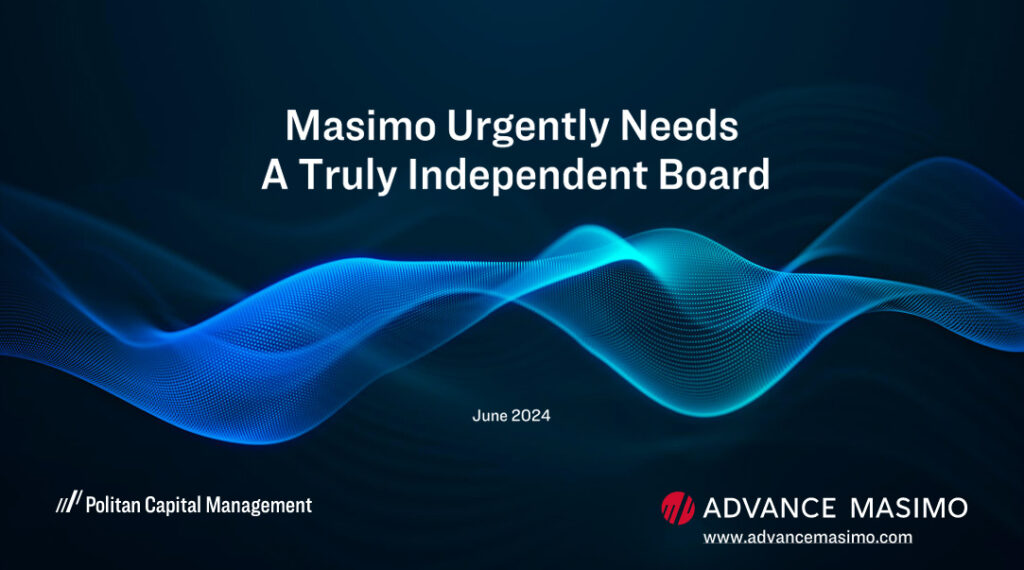
Chancery Court Declines to Force an Earlier Stockholders Meeting
New proxy material produced and distributed to stockholders this week by Politan Capital Management – an activist investor in Masimo Corp (Nasdaq: MASI) – mostly contains information that was already known. The activist investor, as well as Masimo itself, must provide new proxy materials and voting forms as all previous votes were invalidated as a result of a rescheduling of the 2024 Annual Stockholders Meeting to September 19th (originally was to be July 25th).
But Politan included a few pages of updated background information which, among those items I’ve already written about, did include one fascinating or tantalizing bit of new information.
See more on the updated Politan proxy & its new Masimo tidbit
Strata-gee has been following events surrounding Masimo Corporation for a couple of years now, ever since it acquired Sound United back in 2022, a company that manages a portfolio of brands, some of which are significant players in the audio business. With brands such as Bowers & Wilkins, Marantz, Denon, HEOS, and more, for Sound United to be acquired by a medical products manufacturer didn’t make much sense at the time – and for many, including the company’s investors, it still doesn’t.
Making Matters Worse
In fact, the day after the deal was announced, the value of Masimo stock declined precipitously, wiping away almost 40% of its value in just one day. To this day two years later, the value of Masimo stock has never fully recovered to its pre-Sound United acquisition levels. Investors, clearly, were and are turning thumbs down on this disastrous deal.
Making matters worse, the performance of Sound United – now known as Masimo Consumer – began to decline almost immediately post-acquisition – with revenues down and the division losing money. That decline is continuing to this day as Sound United appears to be stuck in a downward spiral. In a recent Securities and Exchange Commission filing, the company says that its non-healthcare (Sound United) “business [is] being affected by the weakening environment for luxury consumer purchases, as well as slowness in the housing market, which has affected installations and upgrades for our home audio components.”
Masimo Attracts an Activist Investor
All of this has resulted in Masimo attracting the attention of activist investor Quentin Koffey, Chief Investment Officer of Politan Capital Management. To Koffey, the solution to Masimo’s problems is simple – get rid of Sound United. So Politan stepped in and acquired around 9% of Masimo stock and agitated to get two seats on the Masimo Board of Directors. It succeeded in doing so after a nasty proxy battle.
However, this story is yet to have a happy ending, as Koffey says that the “legacy” Board (Board members loyal to Masimo CEO Joe Kiani) and company management have strongly resisted greater oversight by the new members of the Board. And so we find ourselves embroiled in another nasty proxy battle as Politan seeks to gain two more seats on the Board for a majority.

Voting Irregularities
As the original July 25th date of the annual stockholders meeting approached, Politan detected voting irregularities, with an investor engaging in a tactic known as “empty voting.” You can read more about this technique in my previous post “More Messy Masimo Madness.”
Last month, this latest proxy battle reached a new level of intensity when on July 15th Masimo suddenly rescheduled its annual stockholders meeting from July to September, set a new “Record date” – which sets the date on which stockholders of record are eligible to vote on company matters – and filed a lawsuit against Politan, Michelle Brennan (a Politan nominee voted onto the Masimo Board last year), and Politan’s new Board nominees, in the U. S. District Court for the Central District of California.
Masimo Lawsuit Says Koffee is Conspiring Against the Company
Masimo’s lawsuit alleges, among other things, that Politan’s proxy materials contain false and misleading statements, that defendants violated the Exchange Act, and breach of fiduciary duties against the newly elected Board members (nominated previously by Politan). Politan denies all claims and says it is confident it will prevail. However, Masimo’s lawsuit also included a shocking allegation that Quentin Koffey was secretly conspiring with a plaintiffs’ bar law firm that was currently in litigation with Masimo. As a Masimo director with access to confidential company files, this would be a clear violation of his duties as a Masimo Board director. Koffey categorically denies this allegation.
On July 17th, Politan filed a verified complaint in the Court of Chancery in Delaware against Masimo, Chairman and CEO Joe Kiani, lead independent Director Craig Reynolds, and Director Bob Chapek. Politan alleged the company and defendants breached Delaware law. One of the reliefs requested was for the court to order Masimo to move up its annual stockholder meeting to the earliest practicable time.

The Tantalizing Tidbit
This latest proxy filing from Politan reveals that in the time since Masimo filed its action against Politan, new information has come to light. Remember, Masimo claims that Quentin Koffey is in a conspiracy with a law firm to attack Masimo (Politan calls this the “Conspiracy Allegation”). In its lawsuit, Masimo did not provide much detail other than to say that it has two “confidential informants” who have levied the shocking allegation against Koffey.
Now, from Politan, we learn more…
“[S]ince the Company initiated the California Action against Politan, it came to light that the Company’s outside legal counsel”…
- …based its Conspiracy Allegation on statements from unnamed sources received from a third-party opposition research firm…
- …never spoke to the unnamed sources themselves to verify the Conspiracy Allegation before initiating the California Action…
- …does not even know the identity of the unnamed sources…
Masimo’s Attorneys Made No Effort to Confirm the Story
The fact that Masimo’s attorneys made no effort to confirm the surprising allegation is not a good look for them. The fact that they chose to immediately file a lawsuit making an allegation from sources they don’t even know is a disturbing fact that may come back to haunt them.
A basic tenet of U.S. law is that you have the right to see and question your accusers. In this case, it likely won’t look good to a judge if Masimo doesn’t even know who these sources are or can’t otherwise produce them. Unless these confidential sources are CIA or FBI agents working on a case of international significance, there are very few exceptions to courts requiring plaintiffs to produce those sources so that defendants can conduct a vigorous cross-examination.
Hell to Pay
And if Masimo does produce these confidential sources and their stories don’t hold up to scrutiny, many judges will view that as Masimo and its attorneys wasting the court’s time. And trust me, you don’t want to be before a judge who thinks you are wasting their time. There can be hell to pay…
Sounds like there is more to this story.
Learn more about Masimo by visiting masimo.com.





Your approach is a model for best practices in the industry.